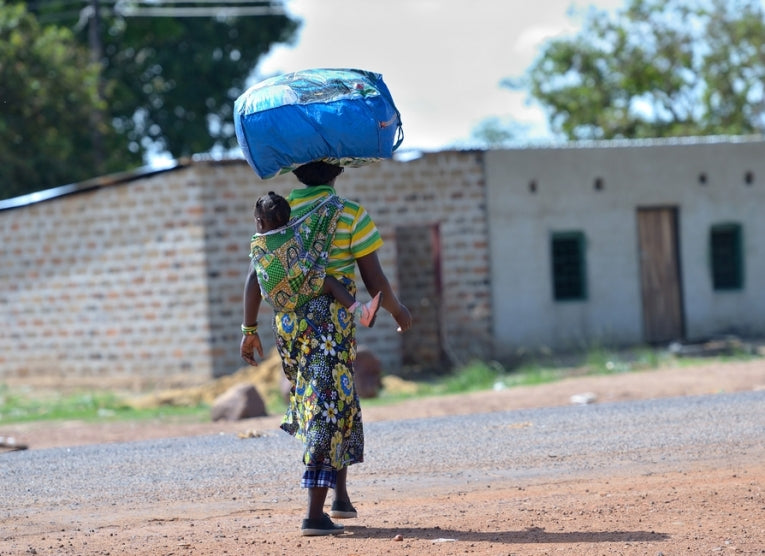Throughout history, women traditionally have been the backbone of society. While men have gone off hunting or fighting, it has always been the women who have quietly stayed behind to run everything in their absence, caring for children and older relatives, managing the home and simply being there when and if the menfolk returned.
In rural areas women have traditionally played a crucial role in agriculture and the local economy. Although in the developed world where modern machinery is now capable of doing much the work formerly done by a large labour force, this is no longer so evident, but in developing countries, where agriculture continues to be largely centred around smallholder farming, a large labour force is still very important.
Rural women and girls make up about a quarter of the world's population and in the developing world women play a vital part in food production from the land.
International recognition of the vital role of rural women was first recognised during the 4th UN World Conference on Women in Beijing in 1995, when several international organisations launched World Rural Women's Day. Very soon this was being celebrated in more than 100 countries around the world.
In December 2007 the UN General Assembly decided that the particular role of rural women should be highlighted by making 15th October 2008 the first International Day of Rural Women. This day was chosen since it is the day immediately before UN World Food Day.
In the words of UN Resolution 62/136, this recognised "the critical role and contribution of rural women, including indigenous women, in enhancing agricultural and rural development, improving food security and eradicating rural poverty."
Even in the developed world rural women still have a very important part to play in the rural economy, but it is in the developing world where their contribution is most significant.
Here, in addition to participating in crop production and livestock care, they are often responsible for providing water and fuel for their families. In Africa, it is women who meet 90% of household water and fuel needs. They will also engage in off-farm activities to diversify the livelihoods of their families.
The extent of the contribution made by rural women can be illustrated by the fact that in sub-Saharan Africa and the Caribbean, women are responsible for the production of between 60% and 80% of basic foodstuffs. In Africa 100% of basic foodstuffs are processed by women.
In Asia, 50% of the labour involved in the intensive cultivation of rice is performed by women and even in industrialised countries, women are responsible for 30% of agricultural work.
All this forms part of what is normally expected of women, namely caring for their families; husbands, children, older relatives, and the sick.
The 2012 International Day of Rural Women takes on an added significance because it coincides with the inception of an inter-agency UN programme on accelerating progress towards the economic empowerment of rural women.
This joint programme is a five-year initiative of UN Women, the Food and Agriculture Organisation (FAO), the International Fund for Agricultural development (IFAD) and the World Food Programme (WFP). This will initially be implemented in Ethiopia, Guatemala, Kyrgyzstan, Liberia, Nepal, Niger and Rwanda.
In addition to improving food and nutrition security, the aims of the initiative are to increase the incomes of women, to strengthen their position as leaders of rural institutions and to foster a more responsive policy environment for the empowerment of rural women at national and international levels.
The role of rural women was further strengthened when in September 2012 the four partner organisations launched a joint programme during the UN General Assembly meeting in New York.
Michelle Bachelet, UN Women Executive Director commented that rural women provide sustenance far beyond their own households. "What they provide - water, fuel, food and income - sustains their families, their communities and their nations."
Continuing on the same theme, Dr Bachelet added that when women are empowered and can claim their rights and access to land, leadership, opportunities and choices, economies can grow, food security is enhanced and prospects for current and future generations are improved.
Ellen Johnson Sirleaf, President of Liberia, echoed these sentiments, agreeing that the empowerment of women is a prerequisite for sustainable development, especially in agriculture. "If you are dealing with women in Africa," she said, "you are dealing with rural women, since the bulk of our women live in rural areas. They feed the nation, they do most of the farming and market most of the products."
A major problem, she went on to say, is that too many rural women still lack the tools and inputs of agricultural production, sometimes even the land itself. In most cases the women do not have the capital they need in order to expend their production.
Another important issue is that although rural women are deeply engaged in food production, processing and marketing, when it comes to the making of important decisions it is usually the men who expect to take the dominant role.
As UN Secretary-General Ban Ki-Moon put it:"I call on all partners to recognize the contribution of rural women to our world, and to help them do even more for our shared future."










